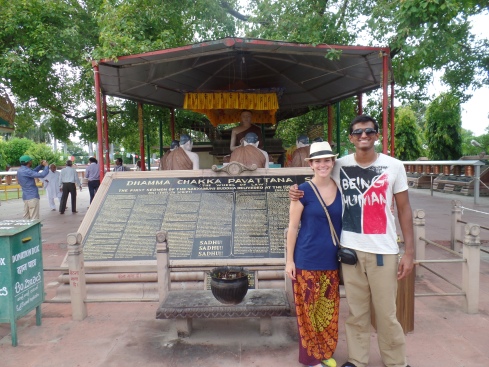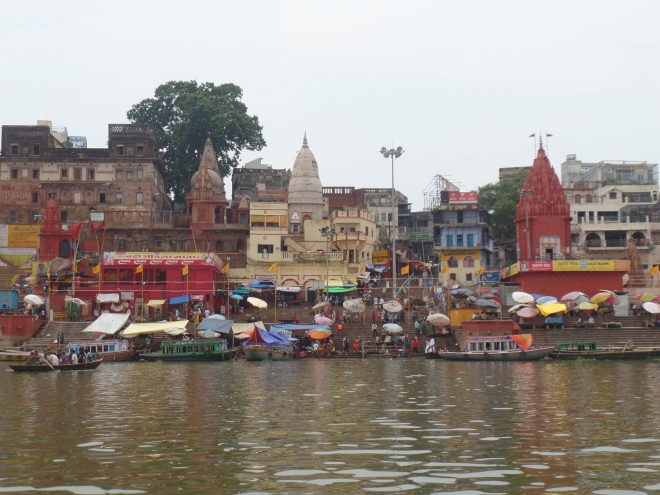Last summer, I had the privilege of visiting one of India’s holiest cities, Varanasi (AKA Benares or Kasi) with my friend Shelby and her brother Brian. Varanasi, which sits on the banks of the river Ganga, is home to countless temples and even some important historical sites of the Buddha1. Many Hindus travel to this city in their last days so they may be cremated and have their ashes thrown in to the river. At the heart of all this religious fervor is one of the most famous temples to Siva2, the Kasi Viswanath temple.

Shelby, Brian, and I left for the Siva temple on a cloudy summer morning. Winding through small cobblestone alleyways still wet from last night’s rain, we held our noses long enough to get through the dirty streets and out onto the banks of the river. Here, we were able to negotiate with a boatman to ferry us out to the famed Kasi Viswanath temple. The ferry ride provided my first moment of confusion that day. While I was making conversation with the boatman in broken Hindi, he asked me to reach my hand in the Ganga and throw some water on my head. Now, sprinkling holy water on one’s head is a fairly common practice in Hinduism and even other religions. But in this particular instance, I had continuously seen cremated remains being thrown into the river over the past few days. Moreover, the Ganga is well-known for not being exactly pristine3. Needless to say, my reaction to touching the water was somewhat like this:

Still, to appease the boatman, who started to guilt trip me about whether I was an Indian or a foreigner, I dashed some of the Ganga water on my head. After reaching the temple, I expected to get a good view of the Siva idol that so many had travelled days to see. Yet, when I reached the idol, he was buried in the offerings of the day’s pilgrims. Milk, honey, ashes, leaves, flowers, and other things kept anyone from even seeing the deity. For me and many other Hindus, the act of visually seeing an idol at the end of a pilgrimage is a calming and profound spiritual experience – often known as darsan – but this temple offered no such luck. I exited the temple feeling underwhelmed, looking around to see if anyone else wanted to shrug their shoulders and say, “huh, I guess that’s it”.
The entire experience left me feeling somewhat angry at the messiness of Hinduism. After making it through insanely dirty streets and getting ripped off by every merchant who could tell I was American, I just hoped to enjoy a view of the famous idol. I couldn’t get that because it was buried in offerings that no one bothered to clean. Why couldn’t people enjoy the idol instead of covering it in offerings? In the western culture of America that I’ve grown up in, I’ve often heard the phrase “cleanliness is next to godliness”. Whenever I’ve stepped inside a church or mosque, they’ve been pristine to a fault, regardless of how much foot traffic the holy site experienced. So, standing outside the exit of the Viswanath temple, scratching my head at my underwhelming spiritual experience, I couldn’t help but feel a bit irked.

I realize that Varanasi doesn’t have the infrastructure of a city like Rome – I can’t expect our holy city to resemble the cleanliness of the Vatican. I realize as well that Varanasi deals with a sheer amount of bodies that many Western holy sites don’t have to contend with. So let’s remove those considerations. I’d argue that our religion is still messy in nature, because of our specific method of ritual prayer. It hardly suffices to sprinkle holy water on an idol during a ritual ceremony. Throwing flower petals in myriad colors is exceedingly common, as is offering substances like honey, butter, etc. onto an idol or into a makeshift fire pit. All of this makes for a mess of leftover petals, congealed sticky stuff, and lots of ash.
Case in point: after I went off to college, my parents converted my room to a prayer room. What was once a normal room now smells distinctly like a temple. The sink is deeply stained by ash and other powders, and at any point there’s bound to be a heap of flower petals in a corner. This has nothing to do with infrastructure or population, and in fact my parents are clean freaks themselves. So why was my room transformed in this way? Why do we feel the need to bury our idols with all these things, why are there so many colors and fires and powders involved in our ritual prayers?
My friend Dhaatri offers an insightful explanation: India’s never been a place for subtlety. From our Bollywood movies down to our food, our culture errs on the side of ornate and obnoxious. Our religious festivals involve lighting firecrackers and lamps, throwing heaps of color at each other, and flying hundreds of colorful kites in the sky. As people that give our full selves in many aspects of life, why should we settle down when it comes to prayer? If we shower our houses and clothes with decorations and colors, why don’t we do the same in our temples? If we love to feast with 20 dishes, why can’t we offer God just that many things when we’re trying to appreciate him? In short, cleanliness by definition is restraint. It means that we try our best to be controlled, to pick up after ourselves politely. What we can appreciate about Hindu prayer then, is that it is unrestrained. There’s a religious fervor here that you have to feel firsthand to understand. What other religion has as many spiritual endeavors that mix with song and dance? Hinduism is a religion where we parade for our Gods, beat the drums and dance till we’re exhausted, just so we know we’ve given all of ourselves in religious pursuit.
[Hindu festival depicted in a popular Hindi movie – the video is obviously dramatized, but the first few minutes provide a good glimpse into how religious celebrations are held in some parts of India]
So in India, maybe cleanliness doesn’t have to be Godliness: maybe there’s a certain beauty in making a mess. This is not an excuse for us to be lazy in the upkeep of our temples, but rather a perspective for understanding the way we pray. The mess that results from religious fervor is entirely different than the one that results from negligence – i.e., I can’t exactly say my room is dirty because of religious fervor. As India’s infrastructure and education improves, I still hope that cities like Varanasi will provide a more welcoming and clean front for its many visitors by cleaning up the negligent messes. But in the future, I’ll accept that my fellow pilgrims shower temple idols with their offerings because that’s just one way of showing devotion.
What are your thoughts on the phrase “Cleanliness is next to godliness”? Does it apply to Hinduism or does the religion approach “godliness” differently? Please comment!
1 – The nearby town of Sarnath is the site of Buddha’s first sermon
2 – As usual, not a reliable source, but good for basic info: https://en.wikipedia.org/wiki/Shiva
3- http://www.ibtimes.co.uk/india-million-litres-untreated-sewage-polluting-holy-river-ganga-says-report-1491715

Great read, thanks for posting!
LikeLike
Great article man! It’s good to understand the psychology behind the way Hindus pray. As you said though, this doesn’t justify the lack of cleanliness, and I’m not saying I agree with the way Hinduism is practiced in these areas. That’s why I’m a big fan of the movie PK. If you ask me, a “True” Hindu would not pollute a river and destroy the environment to show his devotion.
This is an example of how religion gets in the way of sensibility. What many people don’t realize is that Hinduism is a religion designed to teach us to let go of our ego and connect with the divinity within and around us, and frankly I see a whole lot of ego in these examples you speak of. I think people should stop and ask themselves if the God they worship would appreciate the way we treat the world he gave them.
LikeLike
Arjun, thanks so much for your thoughts man!! I agree that on a philosophical basis, Hinduism is about letting go of your ego and realizing God within and around us. However, I think we can agree that the Hinduism of the common man doesn’t really consider that theology. And since that’s the case, perhaps the act of spending money and time to travel somewhere and give offerings to an idol is actually quite a selfless action for the common Hindu. In other words, it’s as close as someone gets to letting go of their “ego”. What do you think?
LikeLike
I re-read your post and this comment, and I completely understand the point you are making here. These examples of uncleanliness you mentioned here really does show how much excitement and fervor people have when they practice Hinduism. So yes, there is definitely something to appreciate in that.
I still think there’s a limit with everything though. If practicing your religion means hurting anyone or anything around you, I don’t see inner fulfillment as a justification for that. While filling up an idol space is not a harmful practice, polluting a river with ash obviously has a very negative impact on our environment. And I don’t think it takes a great deal of knowledge to figure that out, just a little common sense. I guess the reason for saying all of this is because I care a lot about the environment, and it disheartens me to see stuff like this happening in the name of religion, especially the one I call my own.
Another example of a negative consequence of religion is the amount of milk that is poured on an idol during an auspicious day. Animal Welfare is an issue very close to my heart, and I am fully aware of the horrific treatment that cows go through in the dairy industry to provide all this milk that ends up getting wasted on such occasions.
I guess I’m going in a different direction with this response than your post, but I thought I’d share my thoughts anyway since they were relevant. But yes, there is something to appreciate about the passion behind Hindu Practices.
LikeLiked by 1 person
Abhi, this is awesome. Obviously I don’t have the same exposure to Hinduism (learning so many things through your wonderful blog), but your article definitely made me think about how growing up in Catholicism affect my expression of faith and the role of cleanliness within that . A major part of Catholicism is obedience: from the way the Church is structured to how it’s practiced. It does make me wonder what the role of obedience across religions affects the manner in which it is practiced… and I guess the level of cleanliness involved with that practice of religion.
LikeLike
So glad you liked it!! You bring up a really important point when you mention obedience. I’ve seen that a lot of obedience measures in Hindu rituals revolve around knowing when to prostrate, how to offer something to an idol, etc. But I imagine that obedience is very different from how the Catholic church implements it. How do you think obedience in your religion affects rebellion or disassociation with the religion in today’s age?
LikeLike